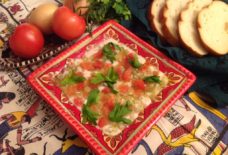Marie El-Khoury: A Remarkable Jewelry Designer
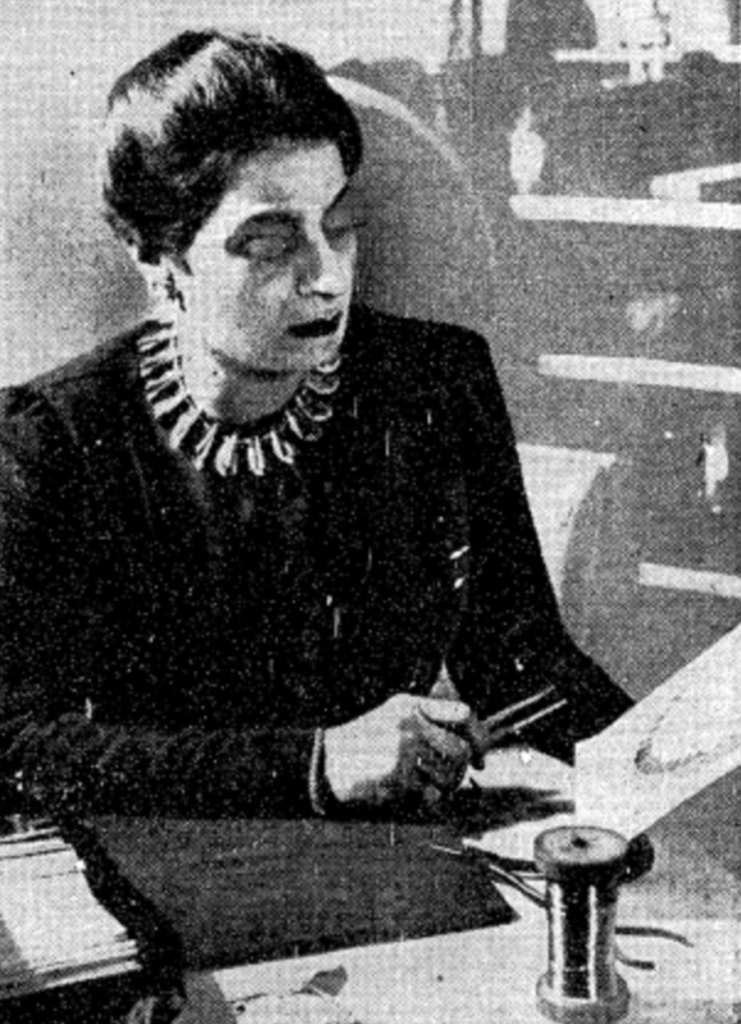
By Arwa Almasaari / Arab America Contributing Writer
In the early twentieth century, amidst the glittering names of Tiffany and Cartier, another jeweler captivated New York’s elite—Marie El-Khoury. Not only was she one of the most sought-after jewelers in the city, but El-Khoury also served as a board member at the Metropolitan Museum of Art and pursued a career as a freelance author. El-Khoury’s life was nothing short of extraordinary.
From Syria to New York: The Early Beginnings
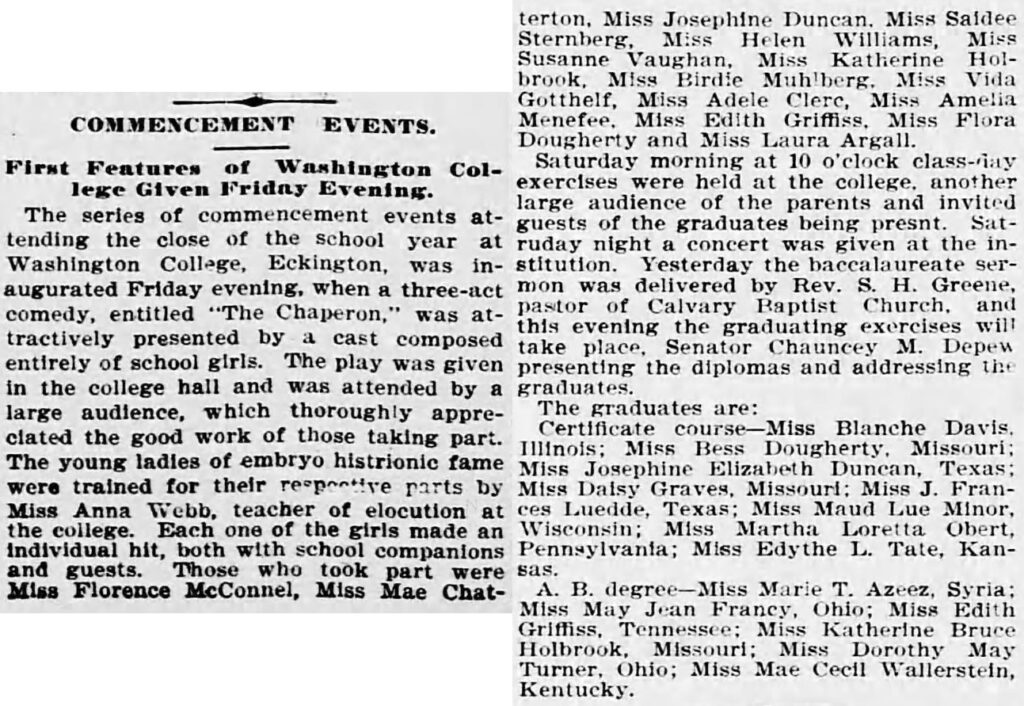
Born in 1883 in what is now Lebanon, El-Khoury was just eight years old when her family arrived in New York Harbor in 1891. The Azeez family initially settled in Manhattan’s Syrian colony on the Lower West Side, where her father, Tannous Azeez, started a small jewelry business from their home on Washington Street, specializing in semi-precious stones. As their fortunes grew, they moved to Brooklyn in 1894, becoming one of the first Syrian families in the area. Later, they relocated to Atlantic City, where Tannous opened “The Shop of T. Azeez” on the renowned Boardwalk.
El-Khoury’s education was exceptional for a girl of her time. She attended Drew Seminary in New York and may have been the first Syrian girl to attend college in the United States, graduating from Washington College for Ladies at just seventeen.
A Career Forged in Adversity

A headline from the New York Times covering one of the burglaries at El-Khoury’s shop in 1941. Image source: New York Times.
In 1902, Marie Azeez married Esau El-Khoury, a fellow journalist, but their happiness was short-lived. Esau passed away just two years later, leaving Marie El-Khoury a widow at the age of twenty-one. Shortly after, her father’s jewelry shop was destroyed in a devastating fire on the Atlantic City Boardwalk. The business was nearly wiped out, and Tannous Azeez, her father, died less than a year later due to complications from surgery. Faced with the loss of both her husband and father, El-Khoury found herself responsible for supporting her mother and sister. She abandoned her journalism career to take over her father’s business. After achieving financial stability, El-Khoury pursued her passion for writing and jewelry, as seen in her Oakland Tribune article that doubled as a promotion for her shop.
Despite the fire and a subsequent burglary that stripped the shop of everything valuable, El-Khoury managed to rebuild the business. Her determination never wavered. She borrowed money from her father’s friends, restocked the shop, and taught herself the art of jewelry design, eventually becoming a master. Not only did she repay her debts, but she also transformed the business into a thriving enterprise. By 1915, she had moved the shop to Manhattan, establishing “The Little Shop of T. Azeez” on Fifth Avenue—an address that marked her arrival among New York’s elite.
Jeweler to the Elite: Making Her Mark on Fifth Avenue
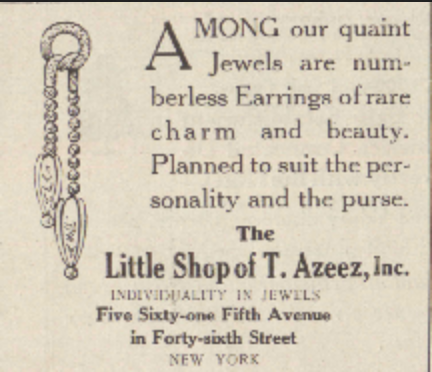
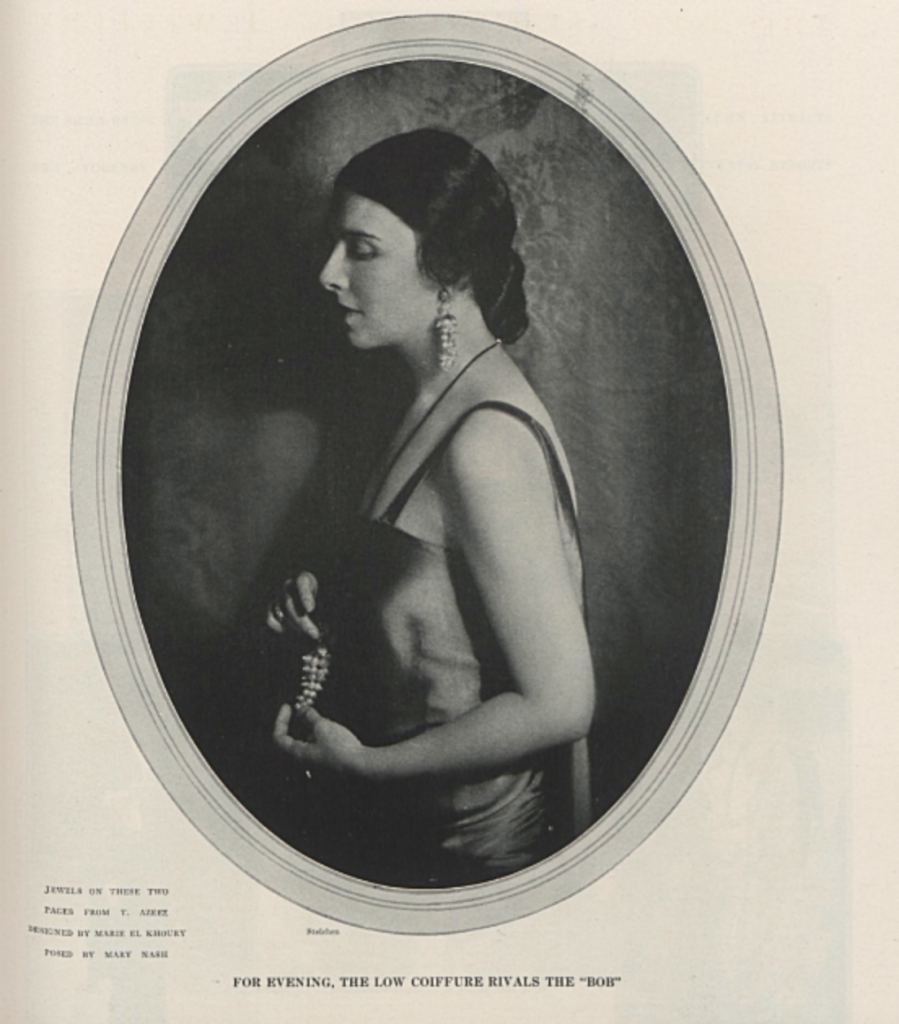
El-Khoury’s shop was more than just a place to buy jewelry; it was a destination for those seeking unique and personalized designs. Her tagline, “Individuality in Jewels,” perfectly captured her approach. Customers could select the color of beads, the number of pearls in a necklace, or even customize pieces to be worn as brooches, pendants, or shoe ornaments. El-Khoury was ahead of her time in offering such personalized services.
Her talent did not go unnoticed. Marie El-Khoury’s designs were frequently featured in prestigious publications like Vogue and The New Yorker. Her pieces were not merely accessories but works of art, exemplified by a $4,500 clip pin described in a 1940 New Yorker feature: “a clip pin made of two fluttering butterfly wings studded with tremendous marquise aquamarines beautifully set in diamonds and platinum.”
El-Khoury was more than just a jeweler; she was a prominent cultural figure in New York. She hosted legendary dinner parties and patronized the arts, supporting notable figures such as the Arab American writer Kahlil Gibran. Additionally, she wrote jewel-themed short stories that were published in Sunday newspapers across the country.
Legacy and Impact
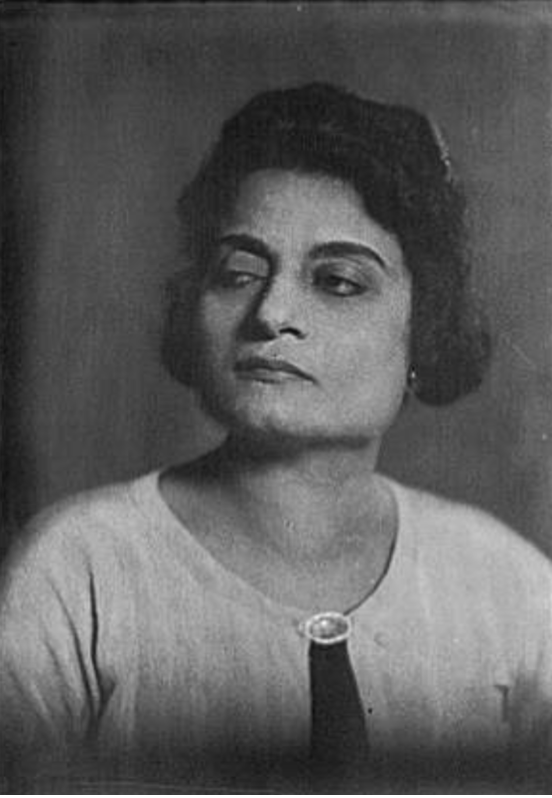
Marie El-Khoury’s influence extended far beyond the glittering jewels she designed. She was a pioneer, breaking barriers in business and society at a time when few women, let alone immigrant women, could do so. Her shop remained on Fifth Avenue for over two decades before she eventually retired in 1955. When El-Khoury passed away in 1957 at the age of 74, she left behind a legacy that continues to inspire. The New York Times obituary described her as “one of this city’s leading and most original jewelry designers,” a fitting tribute to a woman who transformed challenges into opportunities, stones into dazzling jewelry, and accessories into personalized treasures.
Links:
You can check El-Khoury’s designs here.
Read the recently uncovered Khalil Gibran’s letters to El-Khoury (1908-1920) here.
One of Gibran’s letters is translated into English here.
Undated letters from El-Khoury to Ameen Rihany here and here.
You can access El-Khoury’s article in the Oakland Tribune in 1925 here.
You can read a piece about her in the New York Times in 1940 here.
You can check El-Khoury’s obituary here.
Bibliography:
“Art | Turath | Arab Art History and Arabic Art.” Turath, https://www.turath2020.org/art. Accessed 19 Aug. 2024.
“From Gibran With Love: 33 Recently Uncovered Letters .” The George and Lisa Zakhem Kahlil Gibran Chair for Values and Peace, https://gibranchair.umd.edu/feature/gibran-love-33-recently-uncovered-letters-%E2%81%A0%E2%80%94-london-uk. Accessed 7 Aug. 2024.
“Letter from Marie el-Khoury to Ameen Rihani, 1929 May 28,” Moise A. Khayrallah Center for Lebanese Diaspora Studies Archive, https://lebanesestudies.omeka.chass.ncsu.edu/items/show/90452. Accessed 7 Aug. 2024
Jacobs, Linda K. “‘If You Are Wearing Pearls, Wear Nothing but Pearls’: Marie El-Khoury, Jeweler to New York Society.” KalimahPress, 24 Aug. 2015, https://kalimahpress.com/blog/if-you-are-wearing-pearls-wear-nothing-but-pearls-marie-el-khoury-jeweler-to-new-york-society/. Accessed 7 Aug. 2024.
Shakir, Evelyn. Bint Arab: Arab and Arab American Women in the United States. Praeger, 1997.
Arwa Almasaari is a scholar, writer, and editor with a Ph.D. in English, specializing in Arab American studies. She often writes about inspirational figures, children’s literature, and celebrating diversity. You can contact her at arwa_phd@outlook.com
Check out our blog here!


